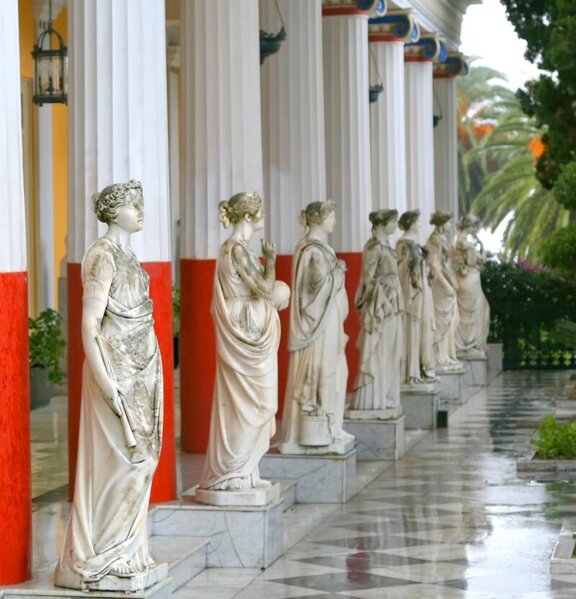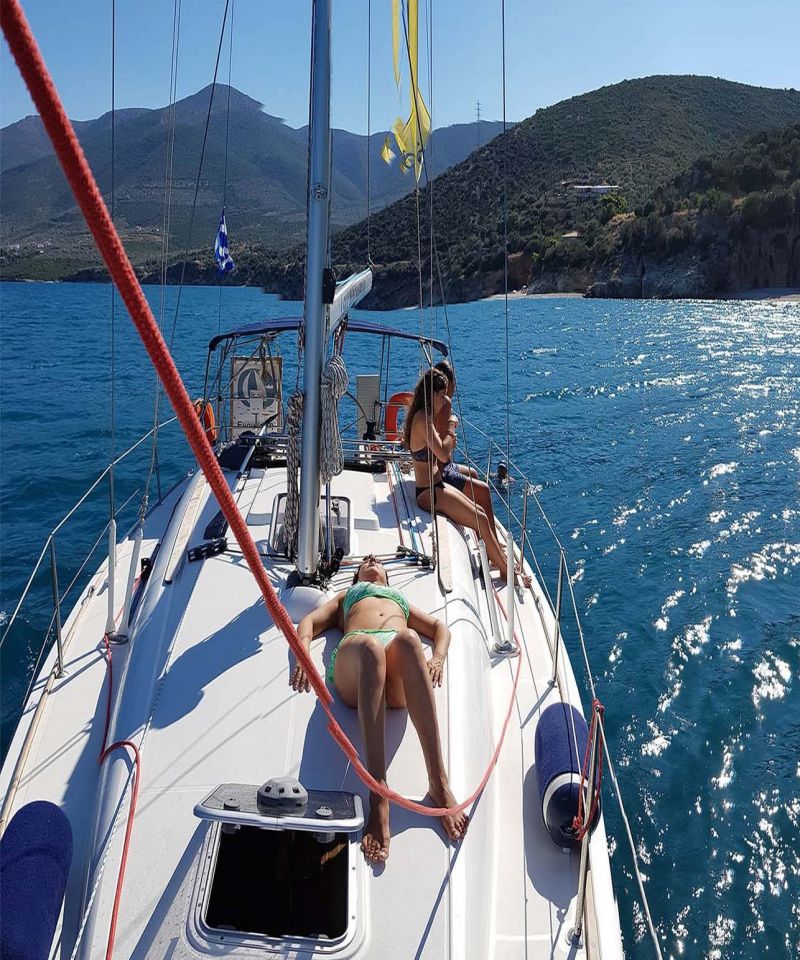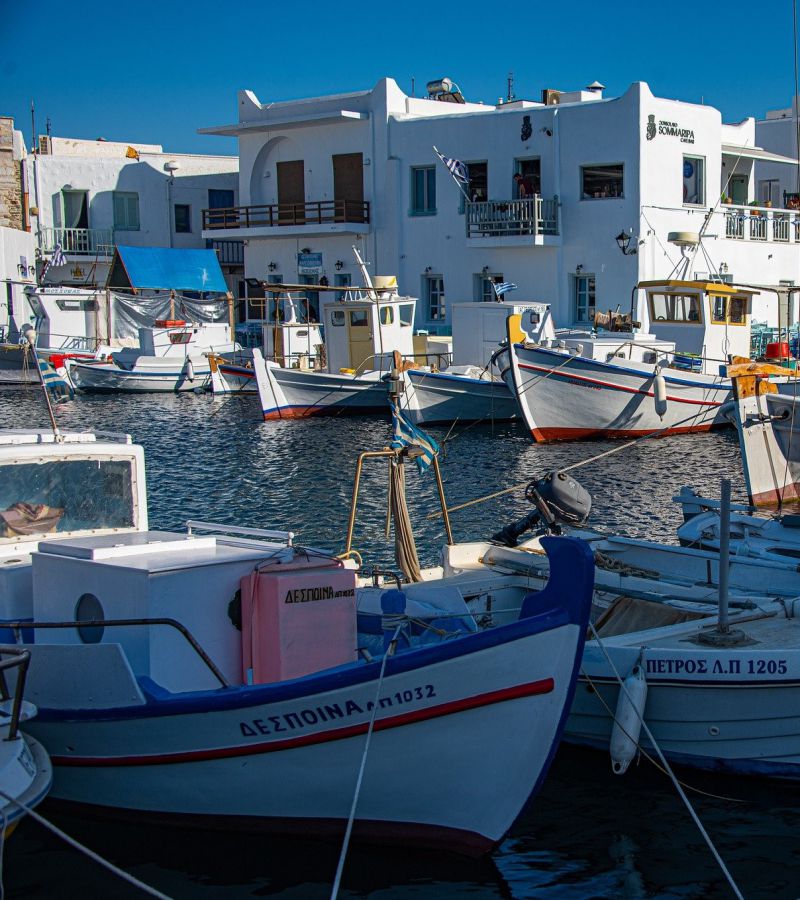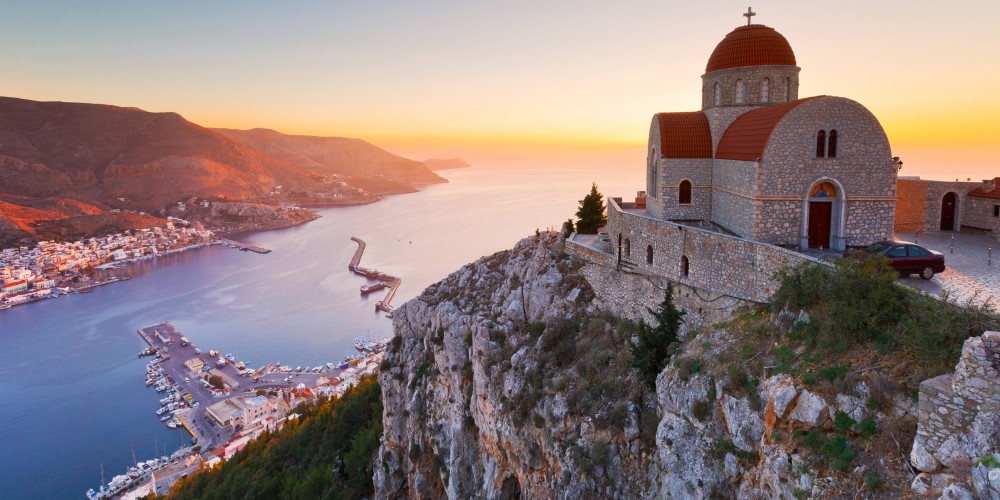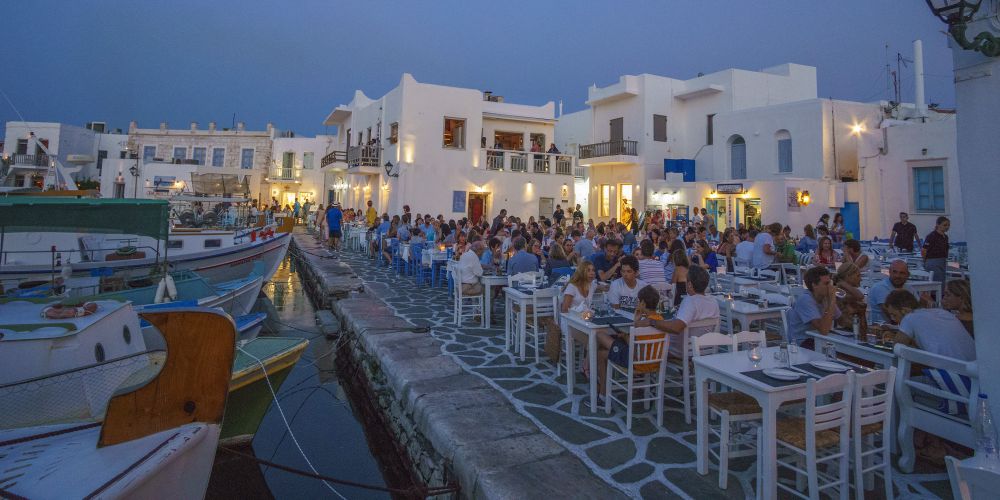
The Best Time to Visit Greece and the Greek Islands
Key Takeaways
- The best weather in Greece is generally between May, June, and mid-September.
- Visiting Greece during the winter months can be cold and rainy, and it's best to avoid it if you don't like cooler weather and rain.
- The best time to visit Athens is during spring and fall, specifically March to May and September to October, while August is an exception due to less traffic and fewer people.
- The best time to visit the Greek islands is during the summer season, specifically mid-June through September.
The land of the gods, Greece, makes for a fascinating holiday destination if you want to delve into the pages of history, culture, and dreamy landscapes.
It never ceases to amaze its visitors, as the country is the ideal culturally exotic destination for all those experimenters who are willing to try something different. However, what is the best time to visit Greece and the Greek islands? Keep on reading for some valuable travel advice!
The climate of Greece

The climate of Greece is typically Mediterranean: mild and wet winters, relatively hot and dry summers, and, in general, long periods of sunshine during most of the year.
In more detail, in the various regions of Greece, a wide variety of climatic types is presented, always, of course, within the framework of the Mediterranean climate. This is due to the topographic configuration of the country, which has significant differences in altitude -there are large mountain ranges along with the central country and other mountains- and the alternation of land and sea.
Thus, from the dry climate of Attica and generally of Eastern Greece, we switch to the wet one of Northern and Western Greece. Such climatic differences are found even in places that are close to each other, which occur in only a few countries around the world.
From a climatic point of view, the year can be divided mainly into two seasons: The cold and rainy winter period that lasts from mid-October until the end of March and the warm and dry season that lasts from April to October.
However, the winter's bad weather is often interrupted in January and the first fortnight of February by sunny days, known since antiquity as "Alkyonides days."
The winter season is sweeter in the Aegean and Ionian islands than in Northern and Eastern Greece.
During the hot and dry season, the weather is stable, the sky is almost transparent, the sun is bright, and it does not rain except for rare breaks with heavy rains or thunderstorms of short duration.
What are the famous 'Meltemia' winds?
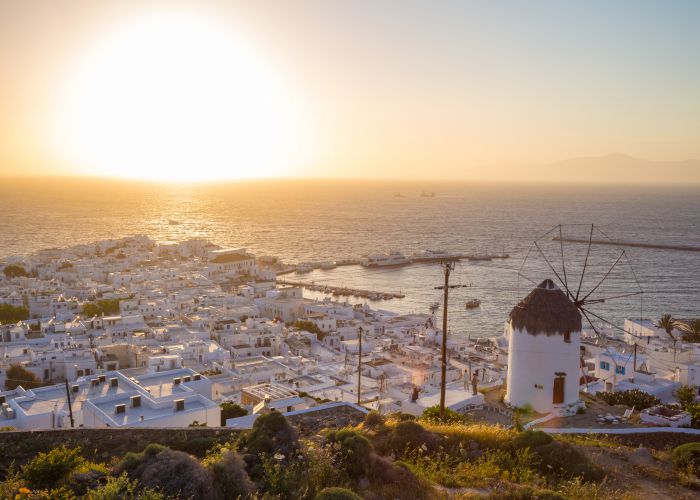
If you plan to visit Greece, you have probably already heard about the winds of the Aegean. After all, the nickname of 'the island of the winds' has not been given to Mykonos by accident. Those winds are called 'meltemia.'
Usually, the beginning of the meltemia winds is placed at the beginning of May, which is called 'early meltemia.' At the same time, in other years, the meltemia period extends until the end of September, which is called 'late meltemia.' However, the most incredible intensity and frequency months are July and August.
In addition to any problems the meltemia winds create in maritime transport, they also have beneficial properties. Although they don't transport gaseous masses, the temperature in the Aegean islands and Eastern Continental Greece decreases significantly compared to the days when the winds don't blow. As a result, visiting Greece during the meltemia winds is quite pleasant.
In any case, even if you visit the Aegean islands in the middle of the summer, make sure to bring with you warm clothing to protect you from the famous meltemia winds and let them refresh you and prepare you for those long days on the beach.
The best time to go to Greece
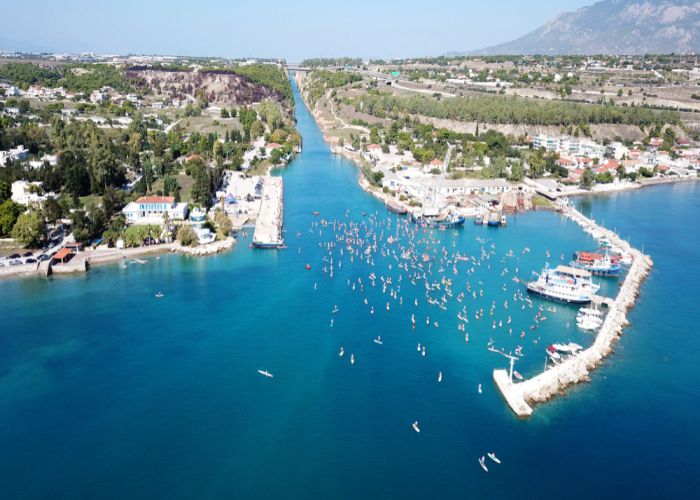
The country's icy winters and very hot, humid summers make for a typical Mediterranean climate, which is ideal for tourism. However, it is arguable that Greece wears its best clothes during the warmer months of the year and in our opinion, during its shoulder season too.
For us, the best time to go to Greece is in spring and autumn, namely May, June, September, and October. One thing to be aware of, however, is that the Greek Orthodox Easter is traditionally celebrated in spring, so make sure to book your trip accordingly if, for some reason, you want to avoid or experience it.
Generally speaking, Greece's best weather will generally occur between May, June, and mid-September. The sunshine with bearably warm temperatures makes the weather in Greece in May perfect for long walks in the country, even in Athens, Greece's capital.
By mid-June, the beaches on the Aegean Islands have become hot enough for swimming, while the massive waves of tourism have not yet hit most Greek islands. Moreover, the high season starts to wind down in mid-September, and the weather is ideal until the end of October.
On the other hand, visiting Greece can get a bit cold or even snowy during the winter months, but it always stays pleasant. The period around November to February is cold because of the rains, a typically Mediterranean-temperate climate.
Winters are mostly cold and wet- rains can hamper your travel plans if you choose that time to visit Greece, so we suggest you avoid booking your trip to Greece around this time if cooler weather and rain are not your cup of tea.
That being said, if you are one of those who love culture, we suggest you plan your trip in the summer, which allows you to enjoy the cultural vibrancy of Greece, such as the Athens Festival, the Patras Carnival, and of course, the numerous wine festivals that take place there all year round.
The mythical land of Greece is waiting for you to charm you and wipe your feet with magic!
Best time to visit Athens
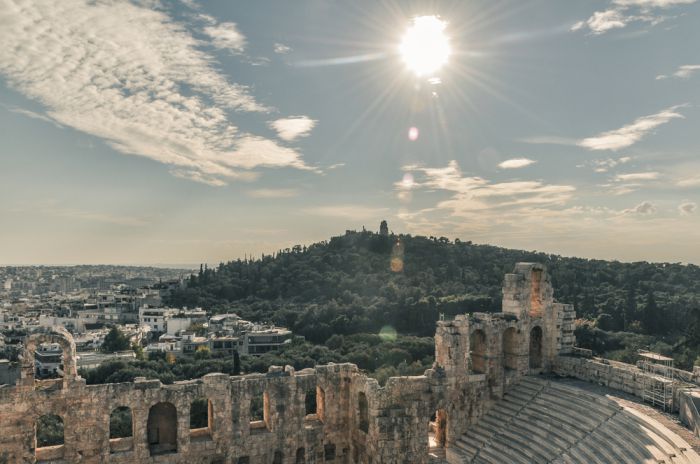
Athens is a perfect year-round destination regardless of the season, as the city experiences relatively warm weather all year round, with some exceptions in the months of December to March.
However, many people argue that the best time to visit Athens is during the spring and fall seasons when the sunny days are comfortable and the weather is pleasant. During that time, you can enjoy the sights in complete comfort in Athens.
The months from March to May are also some of the best times to visit Greece and especially this city. During those shoulder season months, it is spring, and you can enjoy a much more authentic and affordable side of the Greek capital with fewer tourists and a lot more authentic local experiences.
Another great time to visit Athens is in September and October, when the weather cools down, and you will find a drop in the tourist count. This is because the average temperatures fluctuate between 73 and 84 ° F, while the prices are lower and the crowds are thinner.
October to November is also a great -if not the best- time to visit Greece and its capital, Athens. This makes the fall season, and you can find the weather warm and comfortable. Rooms are available for cheaper, and you can take full advantage of the nightclubs and restaurants that reopen after closing during the summer months.
If you are planning to make a trip during the winter season, which is the December-February period, you should not forget to bring a raincoat or an umbrella. Although the weather is not too great during that time and there will be heavy rainfall often, it would be a treat to experience the Greek capital during winter or even Christmas!
Please keep in mind that most events in Athens take place during the summer months. Halloween Carnival in February - March, Independence Day -which is a local public holiday- in March, Greek Easter in March - April, and Athens Festival in June-July are some of the most beautiful festive events here.
Moreover, don't forget that if you want to escape the urban setting of Athens for a quick getaway, there are incredible Greek islands close to the capital. The best Greek islands close to Athens include Aegina, Agistri, Spetses, and Hydra.
Athens in August: The exception to the rule
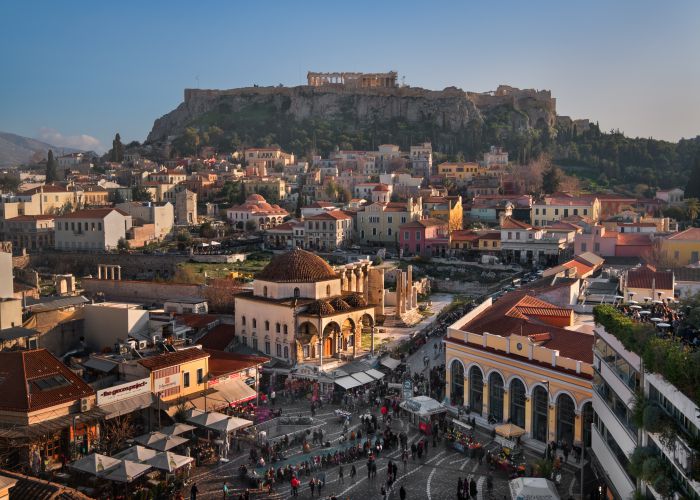
During the dead of summer, the weather can be scorching hot, with the average temperature during the mid-June - August period reaching between average temperatures of 90 and 92 ° F.
As a result, it can be rather unpleasant for visitors to deal with massive tourist crowds and the blazing hot weather. These things are likely to prevent them from experiencing the country and its sights to the fullest, so it's probably not the best time to visit Greece altogether.
However, there are always exceptions to the rules, and this exception applies to visiting Athens in August. As the tourist season approaches its end in August, Attica is virtually unoccupied. August in Athens actually is the locals' favorite season. There is very little traffic and less than 50% of the usual number of people.
Armed with its culture and the beauties it hides, Athens and Attica, in general, can be ideal places for people who will stay "within its walls" in the summer. As the decibels get lower on the streets of the city and the traffic of the vehicles and its inhabitants is diluted, one could say that everything is "transformed" for the better for the visitor.
Comfort in transportation and quick access to destinations are elements that give points to the friendliness of the city, something that Greeks and foreign visitors appreciate. As a matter of fact, the only other time one can come across Athens being that tranquil is the holy week of the Greek Orthodox Easter, when most people travel to their villages for the traditional festivities to commence; the Easter weekend and Easter Sunday festivities are enjoyed best in nature!
There are also many parking spaces, no waiting lines, and everything is much easier and relaxed. As a result, if you're interested in visiting the Greek capital in the summertime, the month of August is the best time to visit it and it should be one of your top choices.
Best time to visit the Greek islands
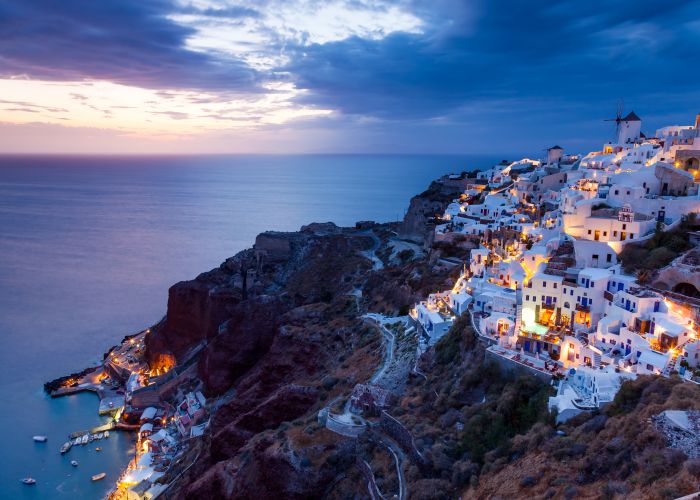
There is no debate regarding the best time to visit the Greek islands like Santorini or Naxos. It is hands down the summer season. During the hot summer months, you will see the authentic Greek island life unfold before your eyes. You will revel in the busy cobbled streets, swim in the striking beaches, and let the sun warm your skin.
The best time to visit Greece because of its climate is between mid-April to early October, with a lot of sunny weather but not much rain. However, it would be better to visit the Greek islands from mid-June through September to enjoy the nightlife and the beaches to their full potential.
You should keep in mind that the peak holiday period in the Greek islands is from the beginning of July to the end of August. When the temperatures are high, crowds of foreigners and locals travel to the Greek islands, so if you want to visit Santorini during its peak, this is the time!
However, you will not miss the hot weather even if you come during shoulder season, such as late May, June, September, or early October, which is an excellent time in the Cyclades and the islands in general.
The best time to visit Greece and the Greek islands essentially depends on the purpose of your visit. Do you like sunbathing and swimming in turquoise waters? The magnificent historical and environmental sights? Is rest or cycling and hiking the reason you visit the islands?
Then we would unreservedly recommend the end of spring and the beginning of autumn as the temperature is very pleasant, the light is softer, the landscape is more beautiful, and there is no massive tourist movement.
If you want to combine your activities and meet a lot of other people when visiting Greece, early summer, as well as July and August, are excellent as the beaches, bars, and nightclubs are at their best.
The most popular Greek islands to visit in the summer
Mykonos

Mykonos is undoubtedly the most cosmopolitan of the Aegean and one of the best Greek islands for a once-in-a-lifetime experience. The country offers magical walks in the alleys with many shops that have the latest fashion, while the island's trademark is the windmills that you can fool around drinking a cocktail in Little Venice.
If you want to enjoy a calmer time on the beach, our travel advice would be to prefer the morning hours for swimming on the beaches of Paraga, Agia Anna, Kalo Livadi, and Elia. But if you want to live the legend and swim next to the celebrities of the world jet-set, then visit Mykonos and opt for the beaches of Psarou, Panormos, and Super Paradise.
Santorini
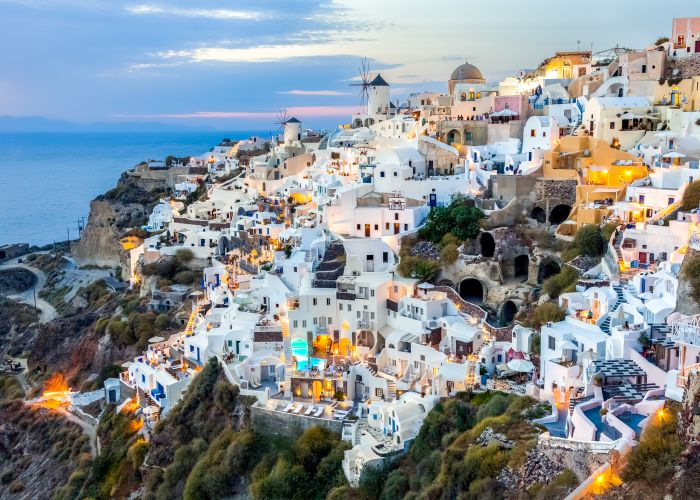
Santorini is famous across the world for boasting some of the most beautiful and magical sunsets in the world. The route from Imerovigli to Oia is nine kilometers and includes gorgeous landscapes of Santorini with cliffs, volcanic rocks, and beautiful blue-domed chapels.
Imerovigli occupies the dominant position on the island because it has the most breathtaking view of the caldera and Thirasia. There is no doubt that you should visit Santorini, even if just for the most beautiful view of the Aegean it offers.
Paros
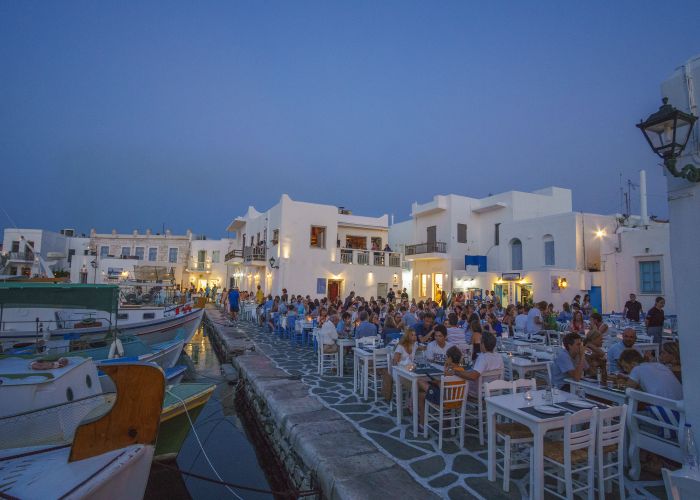
Paros is an island for all ages and all tastes. The picturesque Parikia, which is the city's port, offers endless walks and a calmer lifestyle. Still, you can find everything you could possibly ask for, while it is suitable for family vacations. In contrast, in picturesque Naousa, you can find many bars and clubs right where the waves break that get extremely crowded, and spend unforgettable nights of fun.
Local tip: If you want to experience an authentic Greek Easter, Paros will offer just that with an atmospheric holy week and an explosive Easter Sunday celebration in an idyllic setting by the sea.
Zakynthos
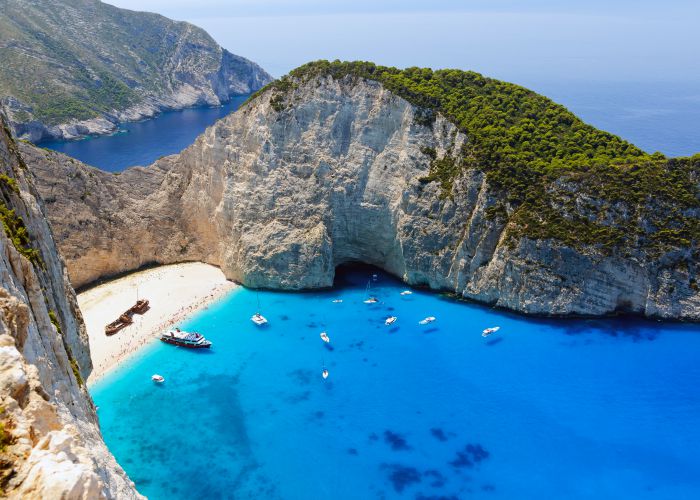
For most, a walk on the waterfront of Zakynthos, and a visit to the Shipwreck, which has been described many times as one of the best beaches in the world, are enough to say you've experienced the best of Zakynthos. In no case, however, this unique Ionian island is so easily exhausted.
If you are in the mood for more, Zakynthos will not stop revealing its beauties to you, both on the impressive beaches and in the green and exciting hinterland.
Local tip: if you opt for visiting Zakynthos island during the shoulder season months, which roughly means before late June, you'll get a better feel of its local culture away from the raging tourist crowds.
Best Greek islands to visit during winter
If you visit Greece or the many Greek islands during winter, you will indeed not find the crowds of people you were used to in the summer on their streets. Despite this, however, some islands maintain their lively character in winter due to their size and population.
Corfu
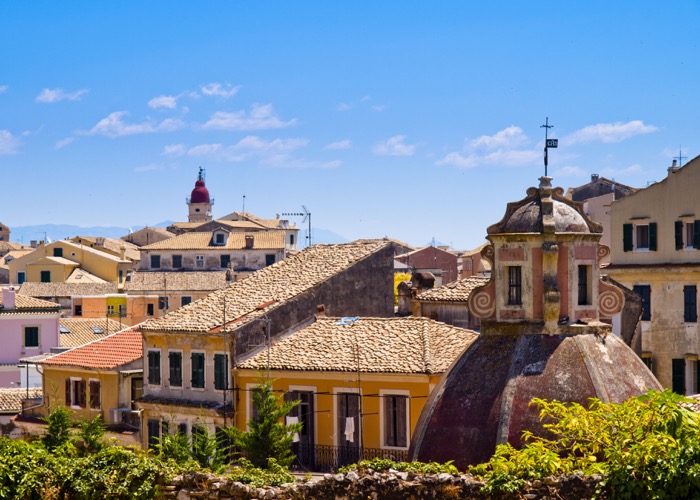
Walking in the alleys of the Old Town, you will find that the Island of Phaeacus in winter has nothing to do with summer since you will see empty streets with minimal crowds.
The island of Corfu, nevertheless, has over 100 thousand inhabitants, which means that it is not deserted and has everything you need, from supermarkets to hospitals.
With the big square of the city, the elegant arches, the famous 'Liston' square, and the paved roads, it will "steal" your heart in winter, while the excursions to the south in the picturesque Gastouri, in Lefkimmi, which is also known for its sweet wine, or, in the village of Pelekas will keep you on your feet.
Kefalonia
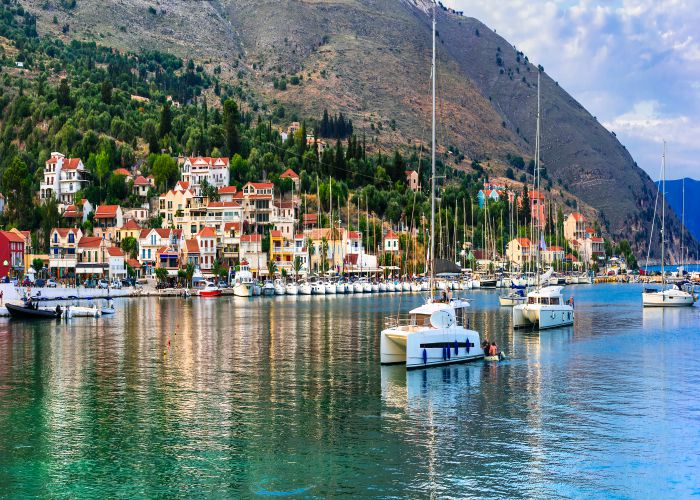
Another island that can be visited during the winter is Kefalonia. This Ionian island remains alive in winter, at least in its capital, Argostoli, with its colossal square and various tourist shops and restaurants.
Make your trips to the "rival" Lixouri, go to the remote Fiskardo, see Assos in the winter background, admire the fierce beach of Myrtos from afar, and go to tourist Sami for a seaside walk.
The famous monastery of Agios Gerasimos is also worth a visit. At the same time, if the weather allows, you can explore Ainos, the highest mountain on the island, which has an altitude of 1,628 meters and has been a national park since 1962.
Syros
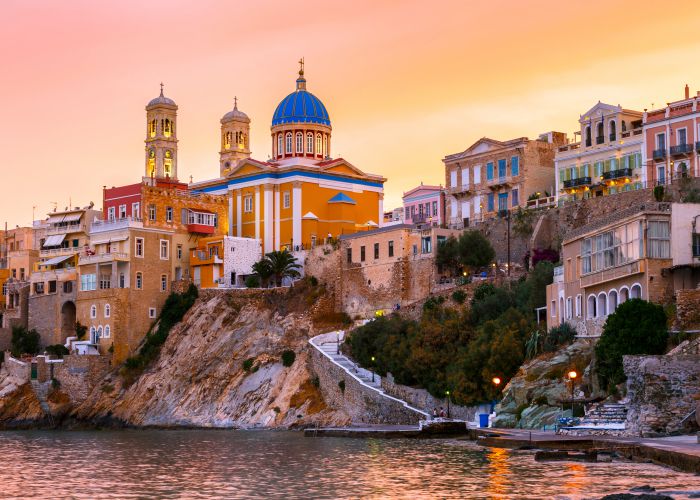
Syros, of course, could not be missing from the list. Its city-like qualities make it not seem out of place during the winter. With 21 thousand inhabitants, it is certain you will not feel alone when walking around the aristocratic alleys of Ermoupolis, the capital of the Cyclades, or enjoying the picturesque corners of Ano Syros. Don't forget to visit the beautiful region of Delagratsia, and watch performances at the famous 'Apollo' theater. What is certain is that the island will not let you get bored.
Naxos
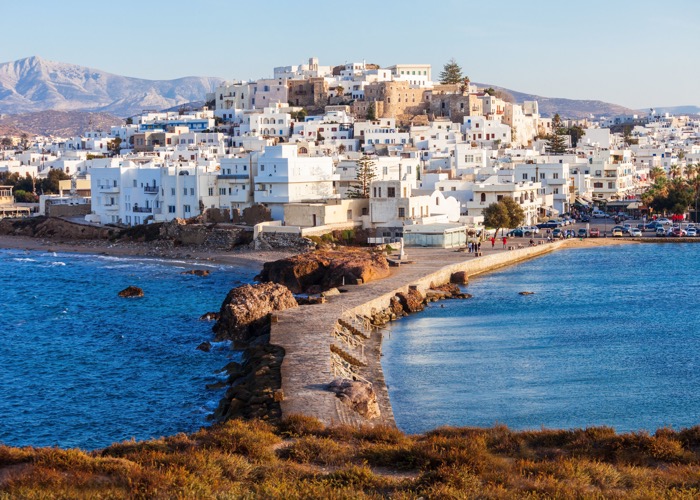
What's more, the largest and most fertile island of the Cyclades, Naxos, is blessed with 18 thousand permanent residents who live and work there 365 days a year. In its Chora, you will find all kinds of everyday comforts, from restaurants to supermarkets.
It is worth visiting the mountainous side of one of the beautiful villages, such as Apeiranthos, Koronos, Leionas, Moutsouna, Komiaki, Apollo, Danakos, where in addition to hospitable locals, you will find some cafes and restaurants open for winter relaxation.
Crete
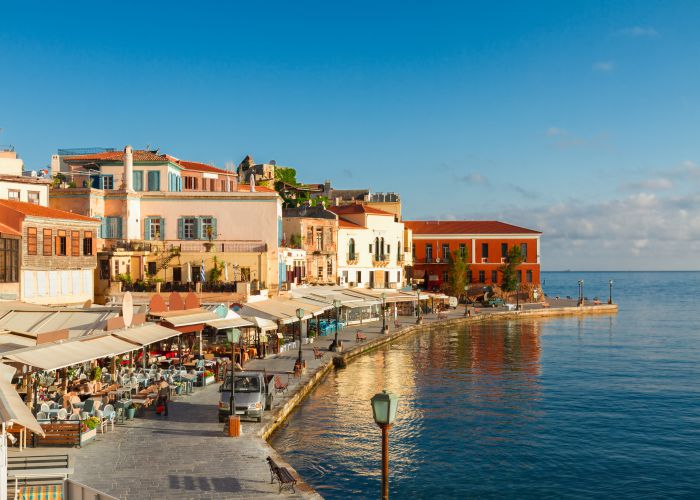
Last but not least, Crete is Greece's largest island, providing an excellent climate in winter. It is probably the best Greek island to visit in the colder months if you're set on seeing the Greek islands regardless of the season your trip to Greece will take place. It is famous for its rural beauty, hospitable locals, rich history, and modern infrastructure, while both the cities and the villages are a sight to behold.
Do not miss the opportunity to hike the dramatic Samaria George and explore the lush vegetation of the island. Tourists can also enjoy the beautiful landscapes of the island and visit the ruins of the ancient Minoan civilization at the imposing Knossos Palace. Shoulder seasons or not, Crete has something for everyone!
Does Greece have warm weather all year long?
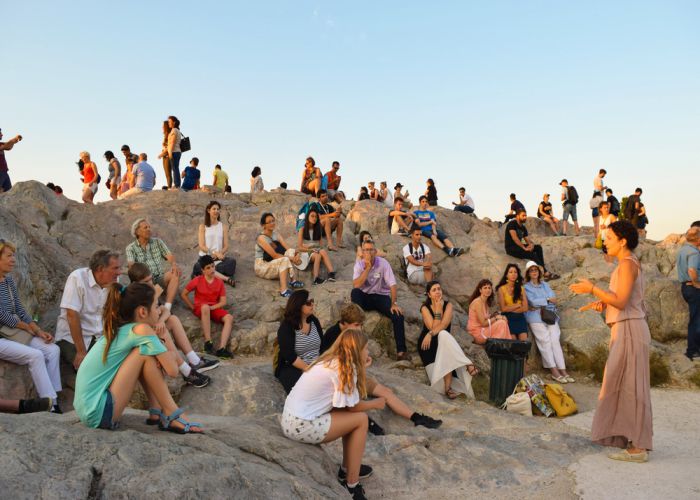
Unfortunately, the short answer is no. Although Greece is known for its relatively mild weather, that doesn't mean it lacks cold weather too. Thankfully, Greece enjoys all four seasons. In the country, summer, spring, autumn, and winter are equally magical but with different temperatures and assets.
Therefore, don't expect bright sunshine and sunstroke beaches if you visit Greece in the middle of winter, and forget about packing flip-flops in December to visit Santorini.
In Greece, spring has a short duration because winter starts late and summer begins early. On the other hand, autumn is long and warm and is often extended in Southern Greece until mid-December.
You can enjoy the striking beauty of Greece all year round and adapt to the temperatures by visiting both the cities and villages of mainland Greece instead of the Greek islands.
What are the coolest and the hottest months in Greece?
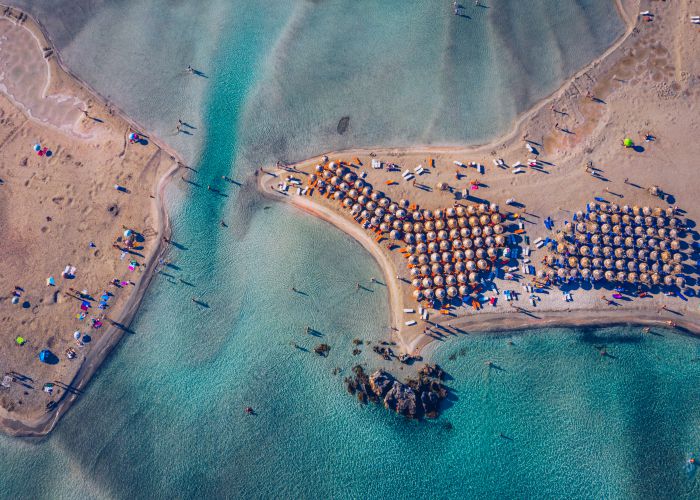
The coldest months in Greece are January and February. Then, the minimum temperature ranges from 5-10 o C in the coastal areas, from 0 - 5 C in the mainland, and lower values below zero in northern regions.
The warmest period is during the last ten days of July and the first of August, when the average maximum temperature ranges from 29 C to 35 C. During the hot summer season, the high temperatures are mitigated by the cool sea breeze in the coastal areas of the country and by the north winds that blow mainly in the Aegean.
When is the rainy season in Greece?
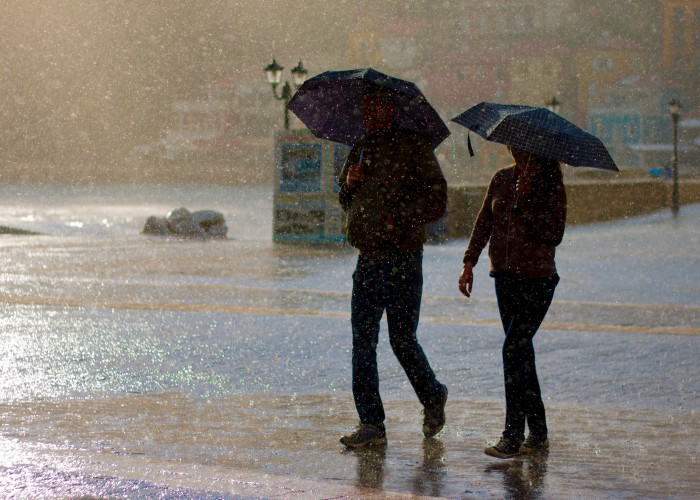
Greece has, on average, rainfall of a total of 31 days - 0.2 inches. The month with the most considerable rainfall for Athens is November, with a rainfall average of 2 feet. A rainless period in the year lasts about three months, between June and late September.
That being said, the rains in our country -even in winter- do not last for many days, and the sky of Greece does not remain cloudy for several consecutive days, as happens in other parts of the world, including other European countries.
Best winter destinations in Greece
Arachova
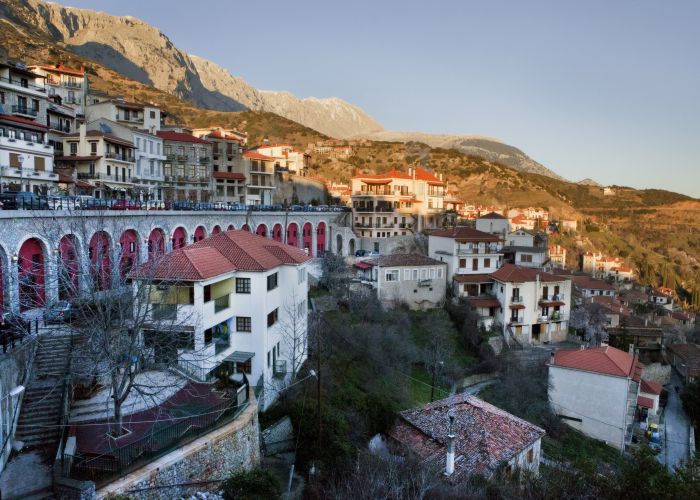
Arachova is the most popular destination during the winter, attracting thousands of visitors every year. Close to Athens in mainland Greece, and built on the southern slopes of Mount Parnassos, Arachova combines the traditional with the cosmopolitan and thus is ideal for all tastes.
Taverns with excellent food but also night bars for hot drinks are waiting for us to visit and experience the absolute winter, as the Parnassos Ski Center is easily accessible. Its manorial beauty and the options it offers make it the "Mykonos of winter."
Meteora

Meteora is located in Kalampaka, in the Thessalian plain. They are a complex of dark rocks on which a total of 24 monasteries have been built. The period during which the first ascetics were created and settled dates back to the middle of the 10th century.
It is a memorable spectacle, as it is the second most important monastic complex in Greece after Mount Athos.
Nafplio
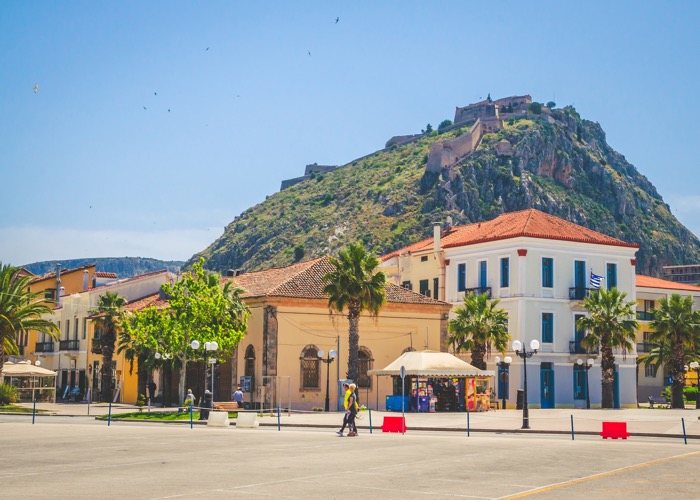
The first official capital of the Greek state, Nafplio, is what you need for every season of the year.
Τhe alleys of its Old Town, balconies of the neoclassical buildings, the romantic ambiance, and the historical significance of the castles of Palamidi and Bourtzi are enough to make this part of mainland Greece a dream winter destination.
The atmosphere of Nafplio is incomparable. It is no coincidence, after all, that it is referred to as 'the most romantic city of Greece.'
Metsovo
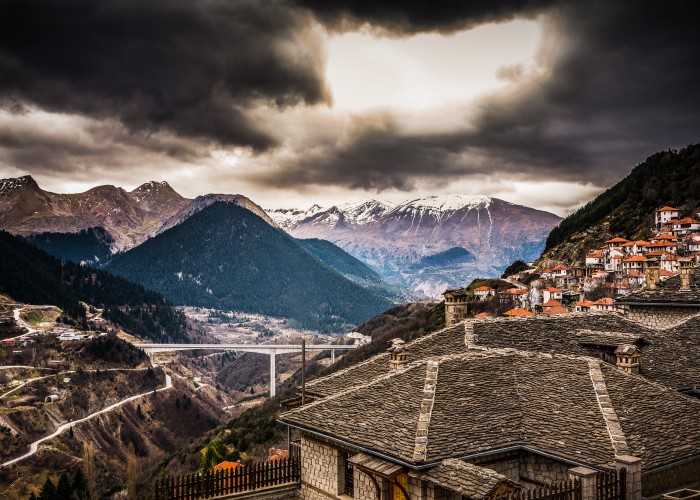
Metsovo, the mountain town of the prefecture of Ioannina, has the necessary traditional atmosphere that we are looking for during the festive season.
However, because we are looking for the best flavors for our palate during the holidays, Metsovo will leave you completely satisfied with it: local cheeses, Metsovo sausages, and boiled goat are just some of the gastronomic delights that will be unforgettable.
Also, the three ski resorts located very close to Metsovo are a unique opportunity to test your skills or to have another unprecedented experience.
Zagorochoria
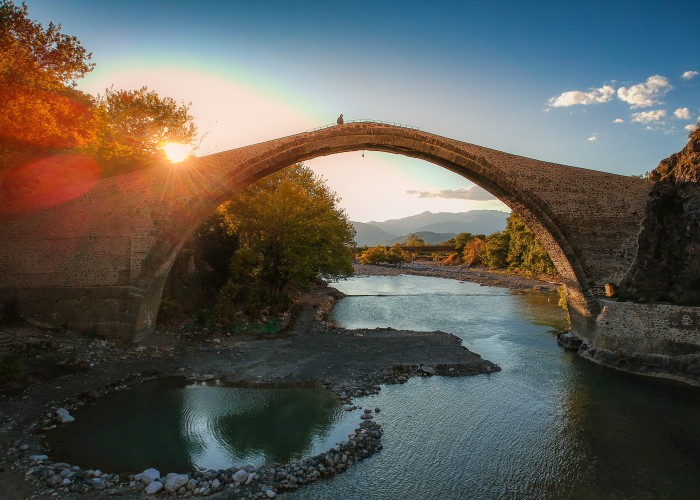
Zagorochoria is a "family" of 46 villages of Ioannina and is a favorite winter destination for many travelers. In Zagorochoria, you can find everything you could hope for.
Each village boasts its own characteristics, whether one is looking for a quiet place, wants something noisier, or just wants to enjoy the view.
There are many activities in Zagorochoria, such as hiking, horseback riding, mountaineering, climbing, rafting, kayaking, and mountain biking.
What is the peak season in Greece?
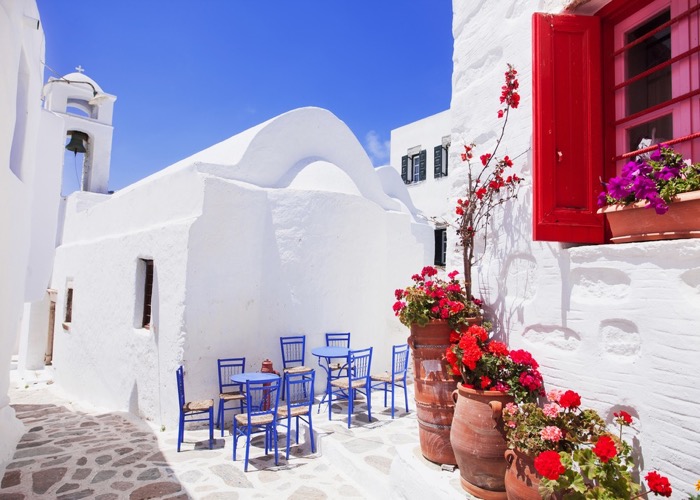
Tourist seasons run in the region of Greece from Easter to September. The peak season is summer and namely the months from early June through August. Naturally, Greece has a flood of tourists during that time, and hotels get fully booked by foreigners and locals alike.
This is why as we have already mentioned, we consider spring and early fall the best time for visiting the country. In August, the temperatures are insanely hot, which sounds great, especially when you come from cooler climates, but it can actually drain your energy.
What's more, the peak season equals large crowds of people also looking for the ultimate Greek summer. This is further supported in part by Greeks who have already decided to go on holiday in masse.
How long does summer last in Greece?
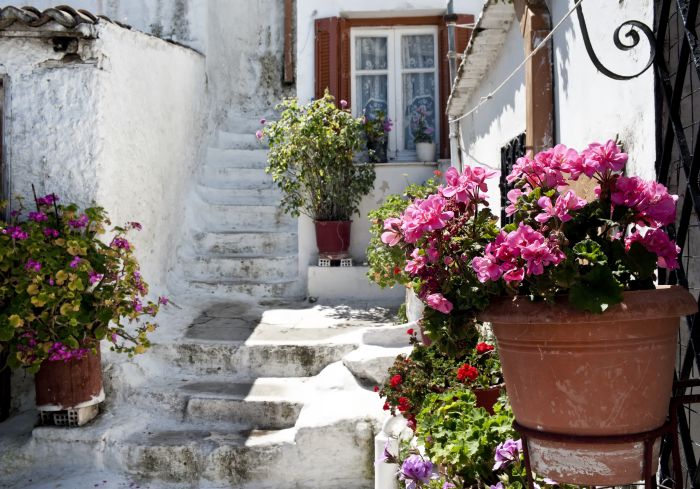
We cannot deny that Greece as a nation is pretty lucky in the weather department. Officially, according to the Greek calendar, summer lasts from the summer solstice, in June, until the autumnal equinox, around September 23.
However, it is a well-known fact that, in actuality, the Greek summer weather begins in April -around Easter week- and lasts until late October. If that sounds magical to you, it's because it is. Long days of sunlight are what the locals usually enjoy and what you should experience as well. Not to mention that the weather in Greece in June is the reason most locals wait for summer to arrive all year long.
Best time to visit Greece on a Budget

A trip to Greece can be designed to be budget-friendly at any time of the year, depending on the destination you choose to visit and the hotels and activities you will indulge in.
Generally, the cheapest time to visit Greece is during the low-season months, namely from November through March. At the same time, the prices have not yet reached their peak in spring and autumn; shoulder seasons exist for a reason!
During that time, accommodation is readily available and usually for affordable prices that are sometimes even half of what one would pay when visiting the high-season months of June, July, August, and sometimes even early September.
As a result, if you want to visit luxurious destinations without breaking the bank, you can do so by switching your arrival dates.
Skyscanner estimates the cheapest months for booking a flight to Greece are September, October, and December. On the other side, the more costly months when booking an airline for Greece are May and June.
Pros and cons of visiting Greece during its low season
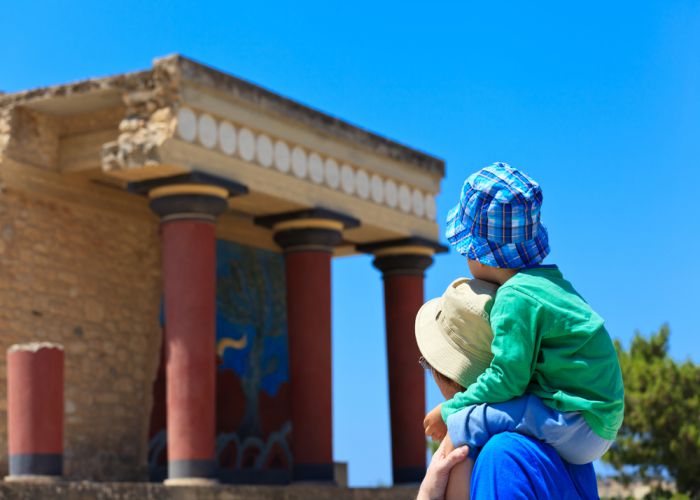
Pros
Fewer tourists
Going against the grain means that you won't have to deal with the masses of tourists who choose the country for their summer vacations when visiting Greece. As a result, there will be no waiting lines on the archaeological sites, and there won't be the need to book your hotel room, your tables, or activities weeks in advance. Fewer tourists and fewer crowds make for happier travelers!
Lower prices
The low season months make for a much more budget-friendly way of travel. During that time, flights and hotel prices are way cheaper, sometimes even reaching half the prices of the more popular months. What's more, without the tourist traps lurking your every step, the cost of living is significantly decreased as well.
Lots of greenery
If you want to go somewhere where the grass is greener, then Greece is the place for you during the low season. Due to the rain that falls in the fall and winter seasons, the summer drought gets replaced with lusciously green landscapes you won't get enough of.
The green landscapes are of unique beauty, especially on the mainland and its picturesque villages, with thousands of species of flora dominating the scenery and creating the most excellent background for your vacation photos.
Even the urban setting of Athens, the Greek capital, gets greener, with the parks in Athens welcoming you for leisurely Athenian walks and relaxation.
Opportunity to explore the mainland
With the Greek islands not as prominent on your mind, Greece's low season offers visitors the opportunity to visit cities, idyllic towns and villages on the Greek mainland that are not as advertised as other parts of the country.
Instead of the typical islands Santorini and Mykonos -which are, of course, a sight to behold but not all there is to Greece- you will get to witness the striking natural beauty of destinations such as Meteora, Delphi, Olympia, and Ioannina, to name a few.
Authentic experiences
Away from the tourist crowds and traps, if you visit Greece during the low season, you will have the opportunity to watch a side of Greece not many people get to experience. In addition, you will have a more authentic feel of what living in Greece really is all about and see the country from a local's perspective.
You will get to mingle and make friends with the hospitable locals and get tips about the best way to enjoy the country. Moreover, you will get a genuine insight into the local culture, and not just the image massive tourism has created for Greece.
For example, there is nothing more quintessentially Greek that celebrating Easter Sunday with the locals; you can even get to light Easter candles and get to know the whole tradition behind it!
Cons
Many businesses are closed.
Especially in the more tourist-driven destinations and particularly in the Greek islands, the end of the tourist season means the beginning of the end of life until the following summer. As a result, many establishments close by the end of September or the beginning of October. Please keep in mind that this may occur also if you visit Greece during the holy week or Easter Sunday, which is a national holiday.
Of course, that doesn't stand true for the Greek capital or the winter destinations in Greece that wait for the low season months to open their business and welcome both locals and foreigners into their cozy establishments.
Cold and damp weather
If you choose to visit Greece during the low season, there is a big chance that you will never get to enjoy the sunny days the country is famous for. Instead, you will be met with cold, wet weather and cloudy skies.
Of course, it is possible for you to be lucky and enjoy some winter sunlight and very little rain, which is not uncommon in Greece. However, if you decide to visit Greece during winter, for example, I wouldn't count on it. It is much better to be happily surprised than to have your expectations high and get disappointed.
Restriction in regard to destinations
In close relation to our first con, with businesses closing and people returning to their base, the destinations you can visit are automatically a lot fewer. So the Greek islands, for example, should be out of the question in our opinion, unless, of course, we are talking about big islands, such as Crete, that manage to maintain their vitality all year round.
This is not necessarily a bad thing. From one point of view, it could potentially help you with the overwhelming amount of choices you would have otherwise and narrow down your options in a helpful and not restrictive manner.
Unable to enjoy the beach holiday Greece is famous for
With the weather not being the greatest, during the low season months, you may miss the opportunity to enjoy the golden sand beaches thoroughly, as well as the turquoise waters everyone keeps waxing lyrical about. Let's just say that during that time, the sea temperatures are not exactly inviting.
However, if you're not too concerned about beach endeavors and would much rather focus on the culture and local experiences you could gather in Greece, the lack of swimming weather won't be a problem. It might even be the best time to visit the country for you!
Best time to visit Greece for Skiing

There are several excellent ski resorts in Greece, and the most popular among them is Mount Parnassus at Arachova. The location is only 2 miles away from Athens and very close to Delphi.
Winter skiing is booming on Greek shores from October until January and even March. At the same time, December is the most popular month for skiing activities due to the cold weather and the Christmas holidays.
Sometimes, the ski season may continue until May or early spring, depending on the amount of snow falling in the mountains. As a general rule of thumb, the highest the mountain top the skiing center lies, the more likely it is to find thick snow on it later in the year.
Best time for Greek Island Hopping

Late spring, summer, and early autumn are all excellent times to visit Greece and embark on a Greek island-hopping adventure. The number of available Greek ferries varies with the demand, so there is more flexibility in transport between the islands.
Usually, the Mediterranean is warm enough to enjoy comfortable swimming sessions from mid-July onward, something you can read about in our guide about the weather in Greece in July. What's more, most Greek islands have the best tourism facilities during this period.
Therefore, you will get to see the Greek islands at their very best and enjoy the best possible weather to be at sea for long periods of time.
Best time to visit Greece for sightseeing

Personally, I find it much easier to walk around the impressive sites in cooler weather and not under the blazing sun.
With that being regarded, the most popular months to visit the ancient sites of Greece are June and May, along with September and October, due to the mild temperatures.
Please keep in mind that the famous Greek ruins can get very crowded during the summer days, and the blazing heat could be a problem. So make sure to bring with you light clothes, wear a hat and sunglasses, and lather yourself up with sunscreen to be on the safe side.
On the other hand, if you are up for visiting Greece for sightseeing during the winter months in the hope of dealing with fewer crowds, you must be aware that some major sites close at 3 in the afternoon or when the sun sets.
Greece's most significant archaeological sites
The Acropolis
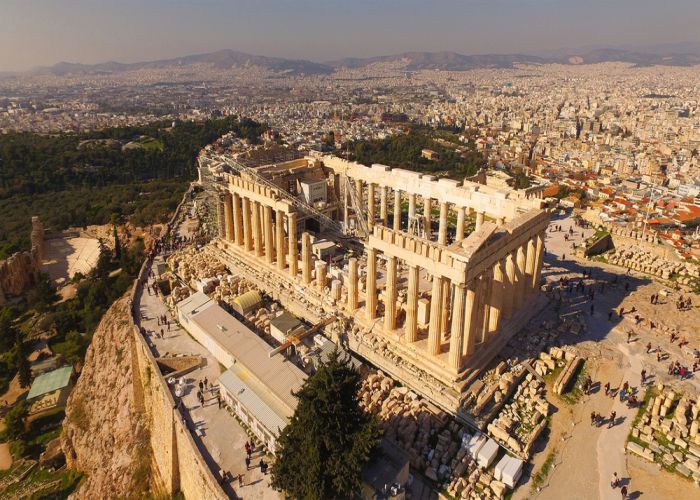
Depicting the cultures, myths, and religions that flourished in Greece for a period of more than a thousand years, the Acropolis includes four of the most important masterpieces of the classical Greek period, the Parthenon, the Propylaea, the Erechtheum, and the temple of Athena Nike, which can be considered symbols of the idea of world heritage.
You cannot visit Greece and skip a visit to the Acropolis. You simply can't.
The archaeological site of Delphi
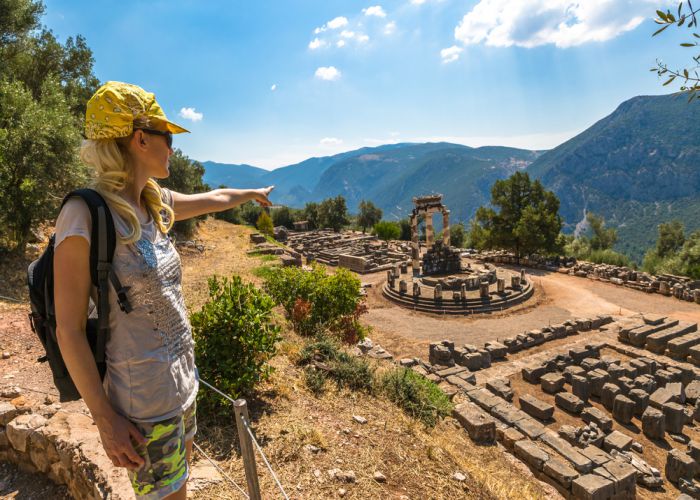
The Panhellenic Sanctuary of Delphi, where the oracle of Apollo was given, was considered the "navel of the earth."
Harmoniously adapted to the exquisite landscape and imbued with sacred significance, the archeological site of Delphi was in 6th BC. century religious center and the symbol of unity of the ancient world.
The medieval city of Rhodes
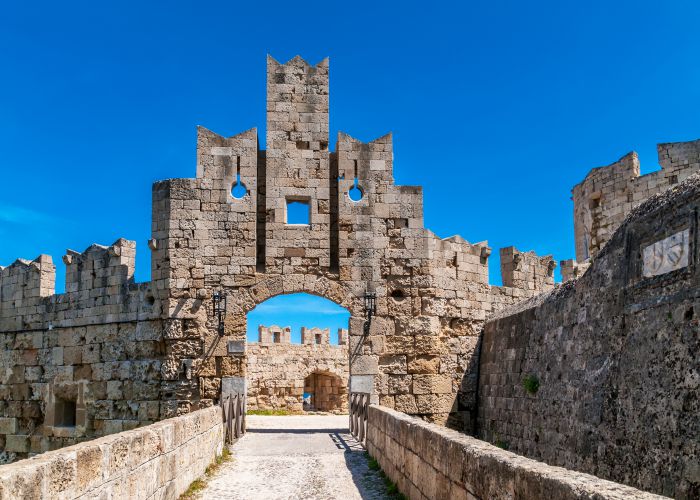
The Order of St. John of Jerusalem occupied Rhodes from 1309 to 1523 and turned the city into a stronghold. Later, the city came under Italian and Turkish occupation.
With the Palace of the Great Lords, the Hospital, and the Way of the Knights, the Upper Town is one of the most beautiful urban centers of the Gothic period. In the Lower Town, Gothic architecture coexists harmoniously with mosques, public baths, and other buildings of the Ottoman period. A walk around its cobbled alleys will convince you that the best time to visit Greece is always!
The archeological site of Olympia
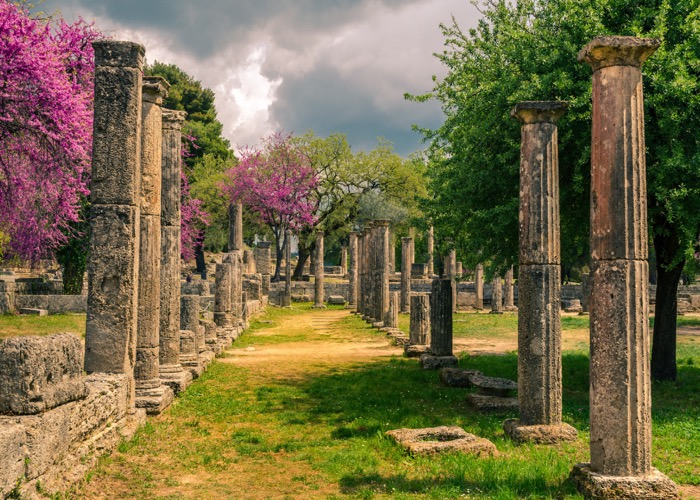
The archeological site of Olympia, in a valley of the Peloponnese, has been inhabited since prehistoric times.
In the 10th century BC. Olympia became the center of worship of Zeus. The monument of Alti - the sanctuary of the gods - gathers essential masterpieces of the ancient Greek world.
In addition to the temples, there are the remains of all the sports facilities created for the Olympic Games and which were organized in Olympia from 776 BC every four years.
Delos
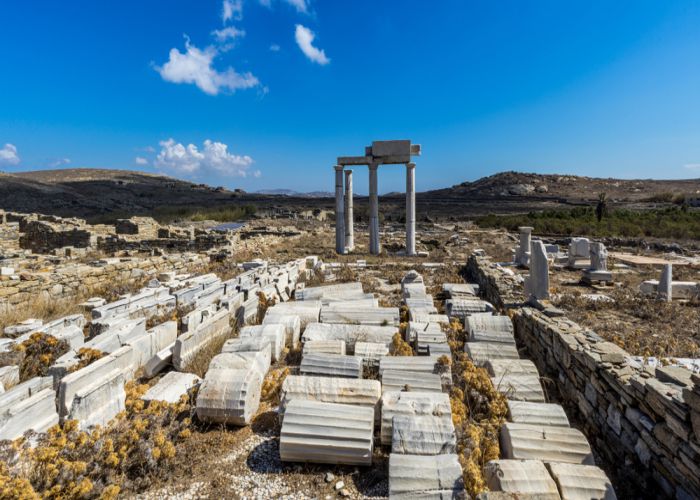
According to Greek mythology, Apollo was born on this small island in the Cyclades. The sanctuaries of Apollo attracted pilgrims from all over Greece, and Delos was a prosperous trading port.
The island has been influenced by the successive civilizations of the "Aegean" world, from the 3rd millennium BC. to the Early Christian era. The archeological site is extremely extensive and rich and gives the image of a great cosmopolitan Mediterranean port through its fascinating ancient ruins.
Best time to visit Greece for a honeymoon

A honeymoon in Greece is a unique adventure. June in Greece is incredibly sunny and has lovely warm weather, which makes it ideal for swimming and enjoying a carefree time in the arms of your newly acquainted spouse.
Moreover, it'd be nice to spend June across the Greek shores as they generally have less traffic than the months of July and August, and maybe even cost a little less.
The same applies to the famous islands of Santorini or Mykonos. However, as it is very expensive any time of the year in those destinations, your honeymoon won't be any more budget-friendly. However, it will be protected from the massive tourist crowds that often destroy the romantic atmosphere.
One thing is for sure: the best time to visit Greece is during your honeymoon!
Best time to visit Greece for swimming

It is all a matter of perspective and preference. For example, many people say you can swim in Greek waters all year round. However, winter swimming may not be on the agenda of most people; especially if they're visiting Greece on a family vacation.
With that in mind, we can agree that in Greece, the latest time you can swim in the sea is early November at the latest, while you can begin your swimming adventures as early as the end of March.
Throughout your summer, you'll enjoy good weather, mild sea temperatures, and impressive coasts you won't be able to resist. It is no secret that the country has some of the best beaches on earth; therefore, visiting Greece for quality beach time and swimming in crystal waters in the Mediterranean sea makes complete sense!
Just keep in mind that during the high-season months and when the country reaches its hottest temperatures, the Greek beaches can get extremely crowded. If you want to avoid that, we would highly advise you to choose the early morning hours or late afternoon for your swimming endeavors.
When should you avoid Greece?
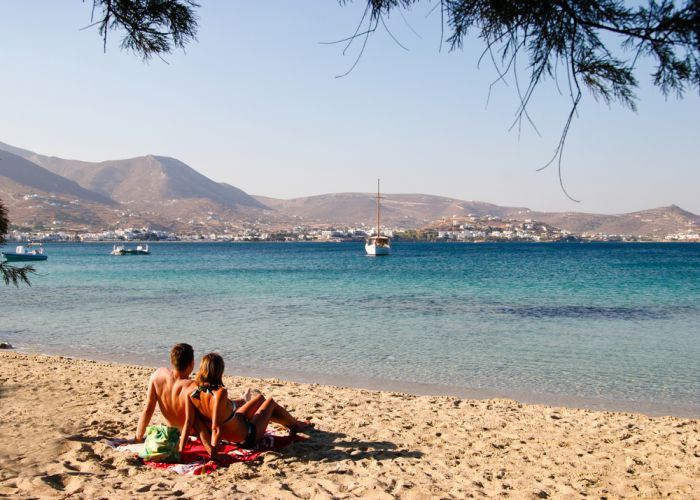
The answer is straightforward and simple: never!
Greece is a destination made of good weather, dreams, idyllic landscapes, and endless fun. As a result, there is no really bad time to visit it.
What we are trying to do with this blog post is find the best time to visit Greece, depending on the purpose of your visit and your preference. We are aiming for perfection to achieve excellence.
Remember: Greece is like pizza -or the Greek equivalent, souvlaki. Even bad pizza is still pretty fantastic pizza. So visiting Greece any time you feel like it is always a superb idea.
Final Thoughts
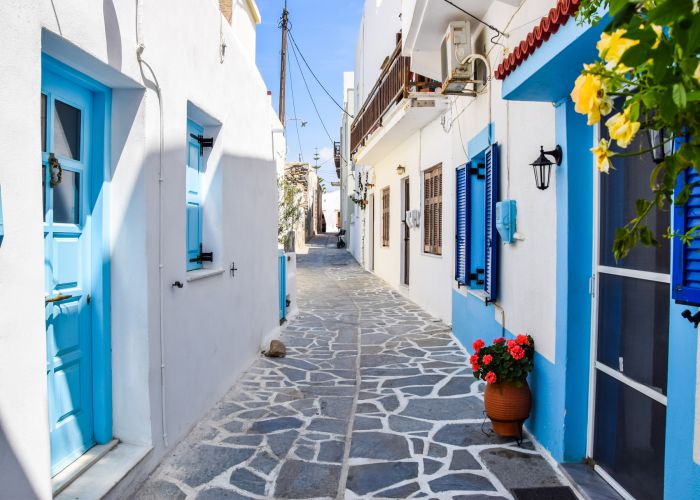
The best time to visit Greece is probably from June to September. Most of the areas are less populated in June, though we have fantastic warm weather and you could go swimming and enjoy the sunshine during the summertime. At the same time, the Greek weather in September is impressive, and sometimes it feels better than summer, as the temperatures are milder.
You must be aware of the month of August, as it is the hottest and most popular month of the year, and lodging and restaurant prices can be pretty high during this time.
Moreover, it would be best if you kept in mind that most hotels, restaurants, or shopping establishments in the islands operate primarily from May to October.
All in all visiting Greece is sure to blow you away with how beautiful and inviting it still looks. What's more, the beaches, intense nightlife, incredible weather, natural beauty, and fantastic historical monuments keep tourists returning for more.
So don't hesitate to take our travel advice and rush to Greece with one of our Greece vacation packages; you can be sure that people will greet you warmly wherever you go either by renting a car In Greece and driving around or by trusting the hands of expert locals to do the dirty work for you.
Are you ready for the Greek holidays of a lifetime?
Frequently Asked Questions
When is the best time to visit Greece?
What is the weather like in Greece during the summer?
Is it possible to visit Greece during the winter?
What is the best time to visit the Greek Islands?
When is the tourist season in Greece?
Will attractions and businesses be open outside of the tourist season?






